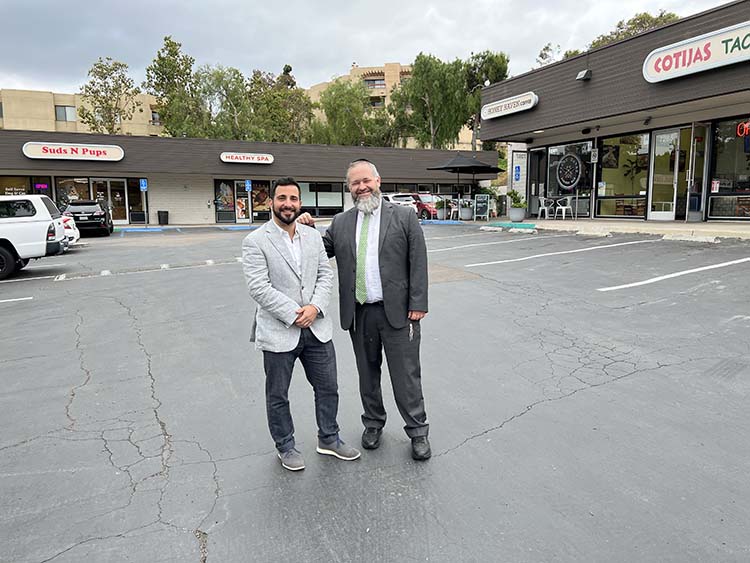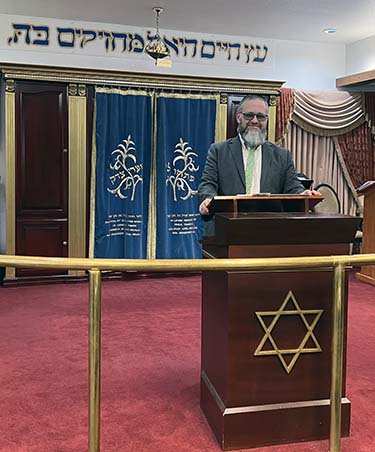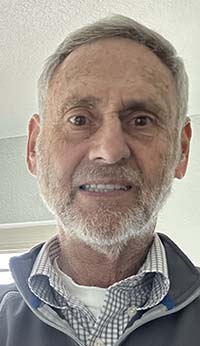
By Donald H. Harrison


SAN DIEGO –Young Israel of San Diego has progressed from renter to landlord in the small Sunburst Square shopping center diagonally across from the trailhead of Cowles Mountain in the San Carlos neighborhood. Rabbi Eddie Rosenberg says the turnaround in the small Orthodox congregation’s fortunes was “miraculous.”
For approximately 30 years, the congregation at 7291 Navajo Road was nestled in a corner of Sunburst Square, conducting morning minyans, providing adult education opportunities, and holding Shabbat and other Jewish holiday services.
Then came word that the Miller family who owned Sunburst Square had been offered upward of $4 million to sell the property to a developer who wanted to tear down the shops and put up 45 condos in their place. This prompted the congregants of Young Israel of San Diego to ponder what they should do if the sale went through.
It was suggested that perhaps congregants could raise enough money to purchase the property themselves, but that seemed more unrealistic than climbing a mountain on the moon, Rabbi Rosenberg said. In the congregation’s entire history, a fundraiser never brought in more than $20,000.
And then, the first miracle came about. A donor, who wants to keep his or her identity a secret, contributed $1 million to the congregation. That was not even a quarter of what the condominium developer had offered, but it spawned an idea of perhaps forming a limited liability corporation (LLC) to make a counteroffer to the small mall’s owners.

Congregant Ron Schottland spearheaded the formation of Y-Young Israel LLC to purchase the 10,500 square-foot Sunburst Square, finding three other equity investors in addition to himself and the synagogue. Knowing that the Miller family — E. Tyler, Mary, and Grant Matthew — were religious Christians, Schottland asked Rabbi Rosenberg to write a letter to the family.
The rabbi wrote the following to the Millers: “In Judaism, we believe that a place has been sanctified for holy use remains sacred even after its intended use is completed. It has been said that even in recent history, young Jewish scholars on their way to studies were paid by Gentile farmers to walk through their fields because they believed such holy purposes would leave a blessing on their field. So too, you may have noticed that in doing business with our synagogue, you, too, have prospered from that relationship in ways that may not be able to be explained in normal economic realities.”
The rabbi’s letter continued: “Aside from the fact that we have been loyal tenants, we have also attempted to do our best to avoid troubling you with minutiae and small problems with which owners usually have to deal. That said, as the rabbi of this congregation, I request that you seriously consider our offer as it will be beneficial for the community, for us, and very much so for you.”
The second miracle, according to Rosenberg, was that the Millers decided to accept their offer rather than that of the developer.
“They accepted our offer, which was a big deal,” Rosenberg marveled. “We had enough to make a down payment and get a loan. I am not good at numbers – only the Book of Numbers – so I don’t remember the percentage, but it was almost miraculous that we got the loan at all.”
Schottland said that at the time Y-Young Israel LLC sought the loan, 40 percent of Sunburst Square was vacant, making the loan a riskier proposition. However, terms were worked out with First Republic Bank which involved Y-Young Israel putting down $1.9 million and financing the rest over 10 years. Schottland also worked out a small business loan for Y-Young Israel.
After escrow was completed on May 1, 2022, the rabbi said, there was another miracle at the center, which is located at the intersection of Golfcrest Drive and Navajo Road: “Within three weeks or a month of buying the center, all those places were taken up, they were all filled up,” Rosenberg said. “There wasn’t any extra effort that we did that the previous owners didn’t do; it was astounding. It was obviously miraculous; there was nothing that we did extra to get people to move in. Some even paid rent for weeks before they were ready to go; they paid up front.”
While Rosenberg is the spiritual leader of the congregation, he is not personally involved in the finances of Y-Young Israel LLC, from which profits are split five ways. The congregation’s monthly mortgage payments on the property are covered, and rents paid by other tenants further contributes to the congregation’s income stream.
The Young Israel rabbinate is a part-time job for Rosenberg. He also works as the mashgiach (kashrut supervisor) at the kosher kitchen on the campus of UC San Diego.
With the congregation’s physical location secured, Young Israel of San Diego is consulting with the City of San Diego about erecting an eruv (Shabbat boundary) in the San Carlos area to enable its members to carry objects or push baby carriages between their homes and the congregation on Shabbat in conformity with halacha (ritual laws of Judaism).
Eruvim have been erected in La Jolla to serve Congregation Adat Yeshurun; in University City to accommodate the Chabad Center in that neighborhood; and in the College area to accommodate Beth Jacob Congregation and other Orthodox institutions near San Diego State University.
The decision of where to erect the eruv in the San Carlos neighborhood will be influenced by the decision of Beth Jacob Congregation, which is weighing whether to move from its home at 4855 College Avenue in the College neigborhood to the San Carlos area. In a letter to congregants dated February 27th of this year, announcing that a committee had been formed to explore the feasibility of such a move, the congregation’s president Philip Silverman wrote: “Our present and future will be enhanced in a more quiet and less congested neighborhood with newer single-family residences, condominiums, and apartment housing.”
Jeffrey Frankel, executive director of Beth Jacob Congregation, told San Diego Jewish World that a meeting of Beth Jacob’s membership is being planned to discuss the findings of the relocation committee, and that it would be inappropriate to discuss matters with the media at least until after that meeting.
Rosenberg said if Beth Jacob does move to the San Carlos neighborhood, the boundaries of the eruv should be drawn to include the congregants who move within walking distance of Beth Jacob at its new location.
Asked if it were possible that the two congregations might merge, Rosenberg said this was an eventual possibility, but that it was too early in the process to be anywhere near a decision point.
*
Donald H. Harrison is editor emeritus of San Diego Jewish World. He may be contacted via donald.harrison@sdjewishworld.com